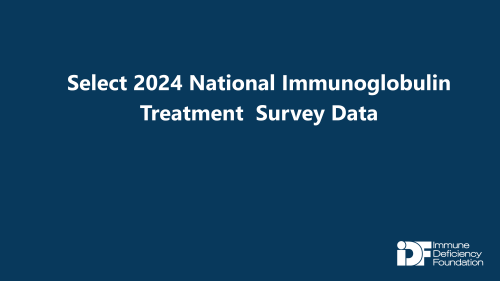
-
Understanding primary immunodeficiency (PI)

Understanding PI
The more you understand about primary immunodeficiency (PI), the better you can live with the disease or support others in your life with PI. Learn more about PI, including the various diagnoses and treatment options.
-
Living with PI
-
Addressing mental health
-
Explaining your diagnosis
- General care
- Get support
- For parents and guardians
-
Managing workplace issues
- Navigating insurance
-
Traveling safely

Living with PI
Living with primary immunodeficiency (PI) can be challenging, but you’re not alone—many people with PI lead full and active lives. With the right support and resources, you can, too.
-
Addressing mental health
-
Get involved

Get involved
Be a hero for those with PI. Change lives by promoting primary immunodeficiency (PI) awareness and taking action in your community through advocacy, donating, volunteering, or fundraising.
-
Advancing research and clinical care
-
Research Grant Program
-
Consulting immunologist
-
Diagnosing PI
-
Getting prior authorization
-
Clinician education
-
Survey research
-
Participating in clinical trials

Advancing research and clinical care
Whether you’re a clinician, researcher, or an individual with primary immunodeficiency (PI), IDF has resources to help you advance the field. Get details on surveys, grants, and clinical trials.
-
Research Grant Program
Members of IDF’s SCID Compass program recently earned recognition for their hard work in discerning the needs of parents whose children have severe combined immunodeficiency, or SCID.
In early May, Frontiers of Immunology, a scientific journal, published the article “Information and Emotional Support Needs of Families Whose Infant Was Diagnosed With SCID Through Newborn Screening.”
SCID Compass program partner Research Triangle International (RTI) wrote the article and IDF staff reviewed it. The article describes how RTI used research methods to determine how parents felt as they cared for their infants with SCID and what informational challenges they faced during their experiences.
A baby with SCID is born without a functioning immune system, making SCID one of the most life-threatening of all primary immunodeficiencies. Infants with SCID not treated with either a bone marrow transplant or gene therapy may not live past their first year of life. Therefore, parents must have access to treatment information in a timely manner and sufficient support to navigate through this critical period.
RTI employed a two-pronged approach to determine areas where parents required the most assistance. Researchers directed parents to complete a needs assessment activity and participate in a survey.
The needs assessment bore out a detailed account of how parents progress through five stages in their SCID journey including diagnosis, pre-treatment, treatment, post-treatment, and the new normal. Researchers learned parents feel a range of emotions from frustration to relief during the stages and have ever-evolving informational needs.
The survey showed that major topics of concern for parents include deficits in information on available treatments, lack of details about SCID in general, and few, if any, resources for emotional support, particularly through connections with other families.
The SCID Compass program has utilized the assessment and survey results to develop a website, along with other educational materials designed to provide parents with a guide on their SCID journey. The research has also laid the groundwork for a virtual support group and webinars to connect SCID families with each other.
“The SCID Compass program would like to extend our heartfelt thanks to the families who participated in data collection, shared their stories with us, and helped make www.scidcompass.org a wonderful and accurate resource for families navigating SCID,” wrote the researchers at the end of the article.
A complementary research summary called “Educational and Support Needs for Families Living with SCID,” is also available. The summary is a two-page brief with colorful graphics, and easy-to-digest nuggets of information presenting the basics of the research results in a reader-friendly and engaging form.
A grant obtained by IDF from the U.S Health Resources and Services Administration (HRSA) allowed the SCID Compass program to enlist the assistance of RTI with the research project.
The SCID Compass program, funded by the HRSA grant, enhances access to and use of educational resources, provides linkages to critical services for patients and families, and develops protocols and mechanisms for long-term follow-up for infants identified with SCID through newborn screening.
Sign up for updates from IDF
Receive news and helpful resources to your cell phone or inbox. You can change or cancel your subscription at any time.





The Immune Deficiency Foundation improves the diagnosis, treatment, and quality of life for every person affected by primary immunodeficiency.
We foster a community that is connected, engaged, and empowered through advocacy, education, and research.
Combined Charity Campaign | CFC# 66309




